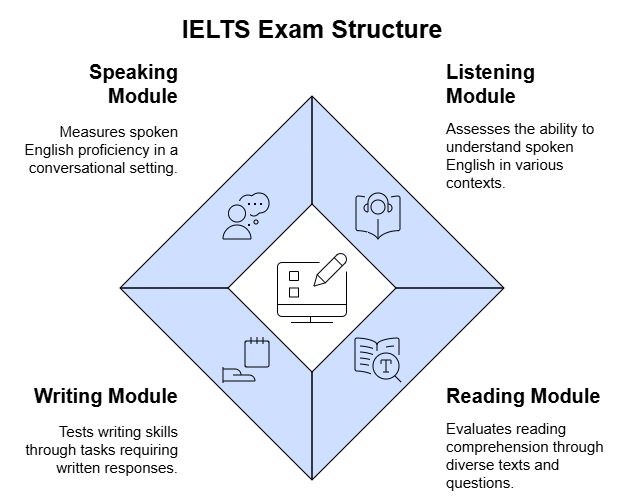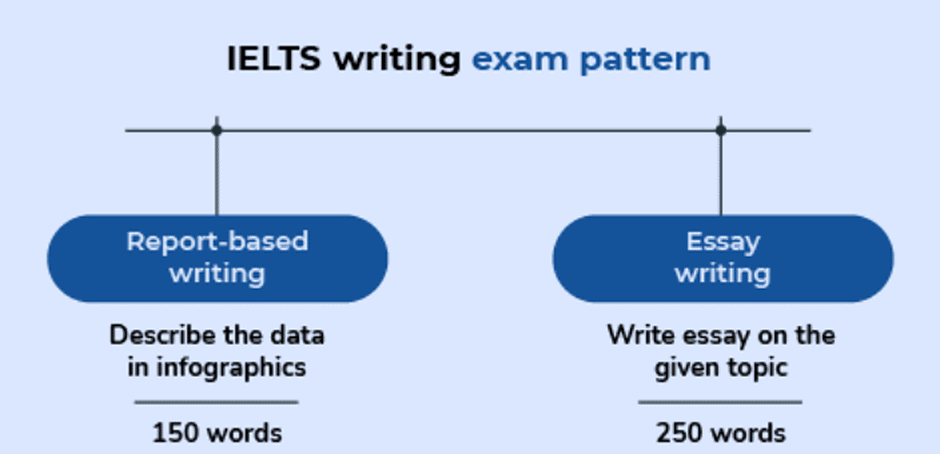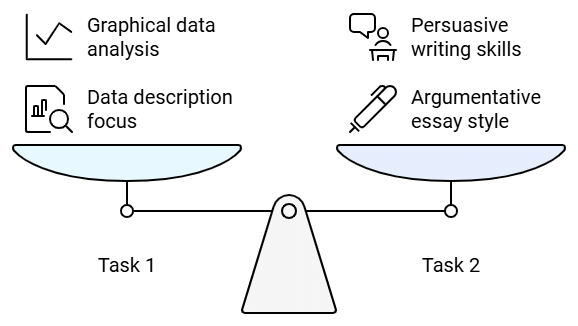Writing Module for IELTS: Exam Pattern & Scoring | Writing for Academic IELTS PDF Download
Before getting into the specifics of the IELTS exam, it is crucial to understand that there are four sub-sections that each examine a different aspect of your language proficiency. Don't forget that mastery of all of these courses is required if you want to describe yourself as an expert user of the English language.
What are the sub-sections?

The sub-sections of the IELTS exam are rendered as the modules of IELTS. There are simply 4 modules, namely:
- Listening
- Reading
- Writing
- Speaking
You can find all the modules for practice on the EduRev app by clicking here.
Let us Discuss the Writing Module in Detail
Total time: 60 minutes
Tasks: 2
Welcome to the “discover yourself” site of the test. IELTS writing enables you to go beyond your limits and explore your ideas about what you observe daily but never speak about. It asks you to voice your opinions about topics that are of general interest and suitability, and test if you are entering undergraduate or postgraduate studies or are seeking professional registration.
There are two tasks
Task 1 - you will be presented with a graph, table, chart or diagram and asked to describe, summarize or explain the information in your own words. You may be asked to describe and explain data, describe the stages of a process, how something works or describe an object or event.
(Time suggested: 20 min)
Task 2 - you will be asked to write an essay in response to a point of view, argument or problem. Responses to both tasks must be in a formal style.
(Time suggested: 40 min)
There are two types of levels of writing offered by IELTS
1. Academic Writing (for students)
2. General Training Writing (for job applicants)
A detailed description of both levels:
Academic Writing:
Task 1 - you will be presented with a graph, table, chart or diagram and asked to describe, summarize or explain the information in your own words. You may be asked to describe and explain data, describe the stages of a process, how something works or describe an object or event.
Task 2 - you will be asked to write an essay in response to a point of view, argument or problem. Responses to both tasks must be in a formal style.

Paper format: There are two Writing tasks and BOTH must be completed.
Timing: 60 minutes
No. of questions: 2
Answering:
Note that: Answers must be given on the answer sheet and must be written in full. Notes or bullet points are not acceptable as answers. Test takers may write on the question paper but this cannot be taken from the examination room and will not be seen by the examiner.
Task 1
- Task type and format: In Writing Task 1, you may be asked to describe facts or figures presented in one or more graphs, charts or tables on a related topic; or they may be given a diagram of a machine, a device or a process and asked to explain how it works.
- Remember, you should write in academic or semi-formal/neutral styles and include the most important and most relevant points in the diagram. Some minor points or details may be left out.
- Know that, you should spend no more than 20 minutes on this task. You are asked to write at least 150 words and will be penalized if your answer is too short.
- While you will not be penalized for writing more than 150 words, you should remember that a longer Task 1 answer may mean that they have less time to spend on Task 2, which contributes twice as much to the Writing band score.
- You should also note that you will be penalized for irrelevance if the response is off-topic or is not written as full, connected text (e.g. using bullet points in any part of the response, note form, etc.). They will be severely penalized for plagiarism (i.e. copying from another source).
- You must write your answers in the answer booklet.
You can study this topic in detail on the EduRev app by clicking here.
Task focus: This task assesses the ability to identify the most important and relevant information and trends in a graph, chart, table or diagram, and to give a well-organized overview of it using language accurately in an academic style.
Task 2
- Task type and format: In Writing Task 2, you are given a topic to write about in an academic or semi-formal/neutral style. Remember, answers should be a discursive consideration of the relevant issues. You should make sure that you read the task carefully and provide a full and relevant response. For example, if the topic is a particular aspect of computers, you should focus on this aspect in their response. You should not simply write about computers in general.
- You should spend no more than 40 minutes on this task. They are asked to write at least 250 words and will be penalized if their answer is too short. While you will not be penalized for writing more than 250 words, if you write a very long answer you may not have time for checking and correcting at the end and some ideas may not be directly relevant to the question.
- Task 2 contributes twice as much to the final Writing band score as Task 1. Therefore, test takers who fail to attempt to answer this task will greatly reduce their chance of achieving a good band.
- Test takers will be penalized for irrelevance if the response is off-topic or is not written as full, connected text (e.g. using bullet points in any part of the response, note form, etc.). You will be severely penalized for plagiarism (i.e. copying from another source).
- Finally, you should make sure that you do not copy directly from the question paper because this will not be assessed.
- You must write their answers in the answer booklet.
You can study this topic in detail on the EduRev app by clicking here.
Task focus: This task assesses the ability to present a clear, relevant, well-organized argument, giving evidence or examples to support ideas and use language accurately.
General Training Writing
Task 1: you will be presented with a situation and asked to write a letter requesting information, or explaining the situation. The letter may be personal, semi-formal or formal in style.
Task 2: you will be asked to write an essay in response to a point of view, argument or problem. The essay can be fairly personal in style.

Paper format: There are two Writing tasks and BOTH must be completed.
Timing: 60 minutes
No. of questions: 2
Task types:
In Task 1, you are asked to respond to a situation, for example, by writing a letter requesting information or explaining a situation.
In Task 2, test takers write an essay in response to a point of view, argument or problem.
Answering: Remember, answers must be written in full in the answer booklet. Notes or bullet points in whole or in part are not acceptable as answers.
You may write on the question paper but this cannot be taken from the test room and will not be seen by the examiner.
Task 1
- Task type and format: In Writing Task 1, you are presented with a situation and required to write a personal response in the form of an informal, semi-formal or formal letter of at least 150 words in the answer booklet provided.
- The situations you are asked to write about are common, everyday ones such as: writing to a college accommodation officer about problems with accommodation, writing to a new employer about time management problems you are having, writing to a local newspaper about a plan to develop a local airport, writing to a renting agency to sort out problems with the heating system in their house.
- You shouldn’t worry much because you will be told what kind of information (in the form of three bullet points) you must include in their response. You may be required to request or give information and/or explain a situation. To do this, you may need to do some of the following: ask for and/or provide general factual information, express needs, wants, likes or dislikes, express opinions or complaints, make requests or make suggestions/recommendations.
- The style of writing that test takers use depends on who they are asked to write to (i.e. the audience) and how well they are supposed to know them.
- You need to write in a style that is appropriate for your audience and that will help them to achieve their purpose for writing, e.g. writing to a friend (informal) or writing to a manager (semi-formal or formal). You do not need to include any addresses at the head of their letters.
- Always remember, you should spend no more than 20 minutes on this task. You are asked to write at least 150 words and will be penalized if your answer is too short. While you will not be penalized for writing more than 150 words, you should remember that a longer Task 1 answer may mean that they have less time to spend on Task 2, which contributes twice as much to the Writing band score.
- You should also note that they will be penalized for irrelevance if the response is off-topic or is not written as full, connected text (e.g. using bullet points in any part of the response, note form, etc.). You will be severely penalized for plagiarism (i.e. copying from another source).
You can study this topic in detail on the EduRev app by clicking here.
Task focus: This task assesses the ability to follow English letter-writing conventions (i.e. what order to put information in, what style to use, how to start and finish a letter), to use language accurately and appropriately and to organize and link information coherently and cohesively.
Task 2
- Task type and format: In Writing Task 2, you are supposed to write a semi-formal/neutral discursive essay of at least 250 words in the answer book provided.
- If you find this part difficult, don’t panic, the help is provided with the task instructions that give information about a point of view, argument or problem. They then will tell you how to discuss this, which may involve providing general factual information, outlining and/or presenting a solution, justifying an opinion, and evaluating evidence and ideas.
- Topics are of general interest, - such as: whether children’s leisure activities should be educational, why families are not as close as they used to be and how they could be brought closer, how environmental problems can be solved, who should pay for the care of old people, whether smoking should be banned in public places.
- You should make sure that they complete the task carefully and provide a full and relevant response. You should organize your ideas clearly and make sure to support your argument with relevant examples (including from their own experience where relevant) or evidence.
- For this task, you need to be able to communicate more abstract and complex ideas and use a range of vocabulary and grammatical structures.
- Task 2 contributes twice as much to the final Writing band score as Task 1. Therefore, test takers who fail to attempt to answer this task will greatly reduce their chance of achieving a good score.
- Test takers are asked to write at least 250 words and will be penalized if their answer is too short. They should spend no more than 40 minutes on this task.
- Test takers should also note that they will be penalized for irrelevance if the response is off-topic or is not written as full, connected text (e.g. using bullet points in any part of the response, or note form, etc.). They will be severely penalized for plagiarism (i.e. copying from another source).
You can study this topic in detail on the EduRev app by clicking here.
Task focus: This task assesses the ability to follow English discursive writing conventions (i.e. what order to put information in, what style to use, how to start and finish discursive writing, how to paragraph), to organize and link information coherently and cohesively and to use language accurately and appropriately.
|
30 videos|206 docs|17 tests
|
FAQs on Writing Module for IELTS: Exam Pattern & Scoring - Writing for Academic IELTS
| 1. What is the IELTS Writing Module format? |  |
| 2. How is the IELTS Writing Module scored? |  |
| 3. What are some common topics for the IELTS Writing Task 2? |  |
| 4. How can I improve my IELTS Writing score? |  |
| 5. Is it possible to take the IELTS Writing Module separately? |  |

















